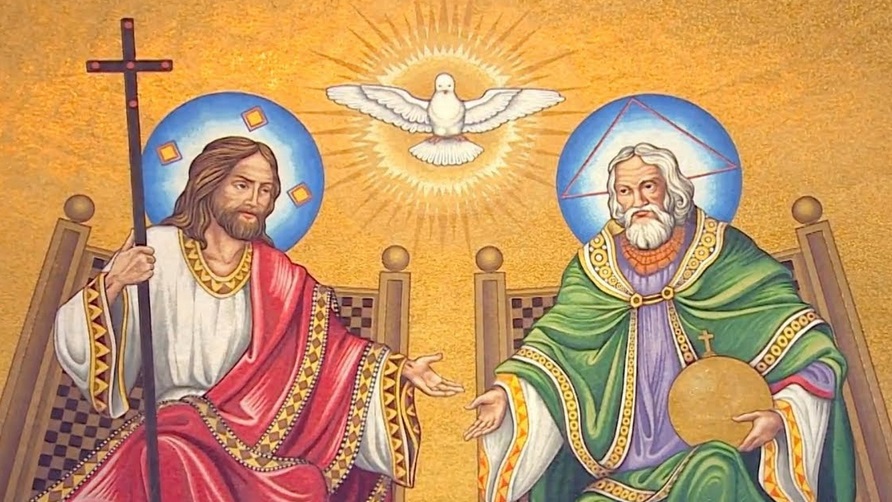Solemnity of the Most Holy Trinity
St Augustine once wrote this about the Most Holy Trinity that “in no other subject is error more dangerous, or inquiry more laborious, or the discovery of truth more profitable.”
Jun 10, 2022

Reflecting on our Sunday Readings with Fr Michael Chua
Trinity Sunday (C)
Readings: Proverbs 8:22-31;
Romans 5:1-5;
Gospel: John 16:12-15
St Augustine once wrote this about the Most Holy Trinity that “in no other subject is error more dangerous, or inquiry more laborious, or the discovery of truth more profitable.” This is not surprising as the Catechism of the Catholic Church speaks of the doctrine of the Most Holy Trinity as the central mystery of our faith. The doctrine of the Most Holy Trinity is not just one teaching among many. It is the Christian teaching of the very nature of God … the core belief and the essence of our Christian faith. Everything a Christian does flows from this teaching, is centred upon this teaching and leads back to this teaching. Yet, we have to acknowledge that this mystery seems to be the most mysterious among the hierarchy of truths which the Church professes and teaches. But how should we understand it as a mystery?
There is a misconception that the mystery of the Trinity is difficult to understand and therefore difficult to teach. We have to get past that. The “mystery” is no mystery in the sense of a puzzle – it isn’t like an impossibly complex mathematical riddle to be solved. Rather, it is a mystery in the same way love is a mystery. We all understand love. Yet, love is inexplicably hard to describe without resorting to metaphors, analogies or poetic language. And like love, we don’t need to be able to fully articulate it before we can grasp it. While I can never fully comprehend the incomprehensible, I can be loved by it. The Trinity is a mystery in the very same way.
Some may argue that if our Lord Jesus truly wanted us to understand this profound concept, He should have spelt it out clearly leaving no room for ambiguity. But He did not do so because as He pointed in today’s Gospel passage. He said that He still has “many things to say to you but they would be too much for you now.”
But this would change with the coming of the Holy Spirit at Pentecost, because when “the Spirit of truth comes he will lead you to the complete truth …”
What is this “complete truth” which our Lord is referring to? For one, it is objective and eternal. In other words, truth is not a matter of consensus. We don’t fashion truth to suit our opinions or desires. It is common today to speak of “your truth” and “my truth,” and that is instead of looking at objective facts, we often hear people speaking of their “lived experiences,” suggesting that every person’s truth is unique and irreplaceable and therefore, infallible and unchallengeable. The complete truth of the Lord, however, cannot be something malleable, easily moulded according to our personal agenda, our likes and dislikes. Rather, it is we who must conform to the objective truths revealed to us by God and humbly submit to it.
But the most complete truth is not like any other objective truth which we can speak of. The self-revelation of God is in fact that “complete truth,” for above the truth of God, there can never be any other truth, and all truth found in the created world is only a shadow and a reflexion of His truth. The inner truth of God is this: that the most original and unconditional love of the Father is matched and answered by the equally absolute reciprocal love of the Son. We can understand and participate inwardly in this mystery of love if the Spirit, who is both the mutuality and fruit of this eternal love, is made to penetrate us. The Spirit binds us to divine love itself. Indeed, this is what St Paul proclaims to the Romans in the second reading, that “the love of God has been poured into our hearts by the Holy Spirit which has been given us.”
Perhaps, the world continues to reject the revelation of the Trinity, precisely because we have been bad witnesses — our lack of love or care for others, our penchant to be selfish and individualistic, our tendency to pander to the maddening crowd, rather than stand up to defend the Truth. How wonderful it would be if we could just reflect the life of the Most Holy Trinity in our own lives? That would be our most convincing and effective way of evangelising.
And so, on the day we affirm once again the truth of One True God in three persons, co-equal in dignity and substance, we recognise that it is less important to focus on the math of the Trinity and more important to focus on the why. Why would God go to all the trouble of creating the world, creating us, and then sending the Son to save us and His Holy Spirit to guide, inspire and sanctify the Church? We arrive at the same answer as the early disciples. God is love. “God has no other reason for creating than his love and goodness: ‘Creatures came into existence when the key of love opened his hand’” (CCC # 293).
(Fr Michael Chua is the parish priest of the Church of the Holy Family, Kajang)







Total Comments:0